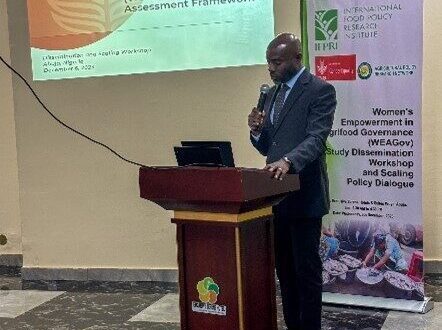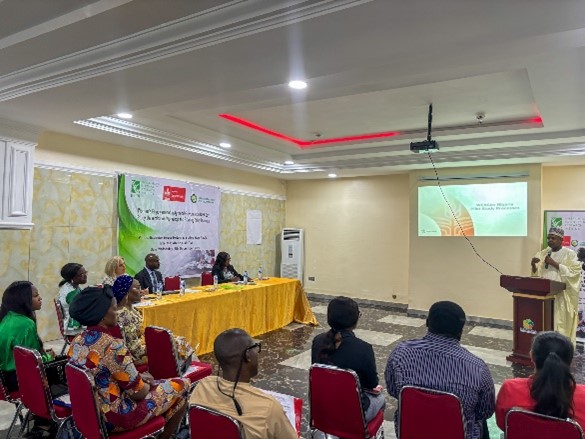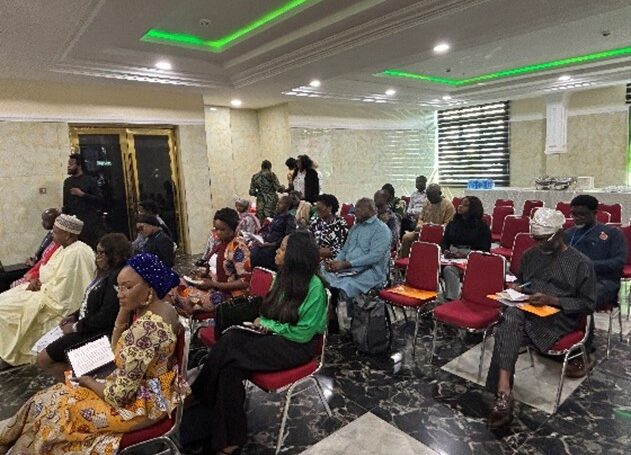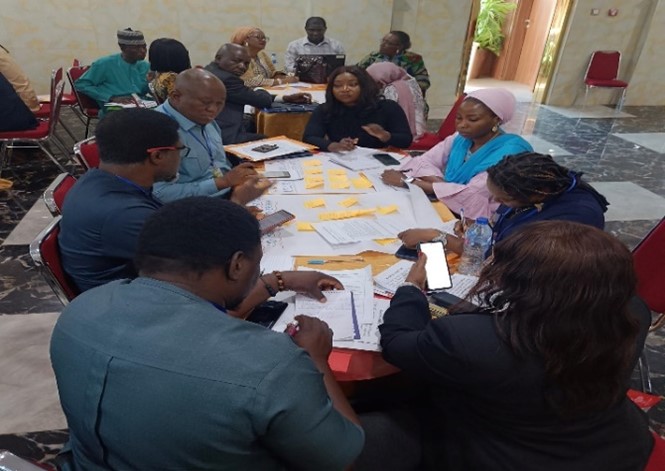
Photo credit: Onilogbo Omobolanle/IFPRI
On December 6, 2023, the International Food Policy Research Institute (IFPRI) organized a workshop on Women’s Empowerment in Agrifood Governance (WEAGov) Assessment Tool under the CGIAR initiative on Gender Equality with the assistance of the Agricultural Policy Research Network (APRNet). The workshop gathered esteemed experts, policymakers, and stakeholders to deliberate on crucial strategies for enhancing gender inclusivity within Nigeria’s agrifood systems.
Prof. Anthony Onoja, APRNet, in his welcoming address, emphasized the urgency of mitigating shocks within agrifood systems while underscoring the imperative of amplifying women's voices in this domain. The pivotal role of women’s participation in agrifood governance was highlighted, along with the significance of measuring and utilizing tools to assess their involvement. This was followed by an opening speech by the Country Program Lead of IFPRI Nigeria, Kwaw Andam.
Kwaw Andam (left) and Senator Abubakar Atiku Bagudu (right) giving their opening speech and goodwill messages.
The Honourable Minister of Budget, Finance, and Economic Planning, Senator Abubakar Atiku Bagudu, echoed the importance of WEAGov in facilitating the Ministry's planning process. Emphasizing the significance of gender inclusivity, the Minister highlighted the challenges faced by women in decision-making and underscored the essential role of women in both economic decisions and production choices. “These kinds of agencies can take advantage of and advocate for the 100 billion Naira agriculture fund.”
Mrs. Ifeoma, Gender Mainstreaming, Ministry of Agriculture and Food Security, representing the Honorable Minister of Agriculture and Food Security, lauded IFPRI for pioneering a groundbreaking study directly addressing SDGs 1 (No Poverty) and 5 (Gender Equality). She stressed that policy directions facilitated by tools like WEAGov were indispensable in addressing gender disparities within Nigeria’s agrifood systems.

Photo credit: Onilogbo Omobolanle/IFPRI
IFPR’s Senior Research Fellow, Catherine Ragasa elucidated the WEAGov framework and tool looks at three dimensions of women’s voice and agency: consideration, inclusion, and influence along the agrifood policy processes: policy design, implementation, and evaluation. Dr. Stella Adejoh, Dr. Olugenga Koleyode, and Dr. Chinasa Onyenekwe presented the methodology, findings, and policy recommendations. Dr. Ragasa emphasized that WEAGov offers measurements and indicators to track complex issues of women’s voice and empowerment in the agrifood policy processes and complements other tools and indices available at global and household levels. The study highlights that while agrifood policies include gender targets, these gender targets are generally poorly funded, implemented, and evaluated in Nigeria. Top women leaders in policy design (parliamentarians) and agrifood implementing organizations (ministers) are few in Nigeria. “Let's pave the way for more women leaders. Women need to organize to raise their voice in high-level decision-making. We are all representatives of women.” Senator Abubakar Atiku Bagudu.
Participants during the WEAGov workshop.
Photo credit: Onilogbo Omobolanle/IFPRI and Nicolette Buono/ILRI
The workshop also featured a breakout session towards greater use of insights from WEAGov and use of WEAGov as a regular monitoring tool by relevant ministries. Breakout groups engaged in solution-driven discussions, deliberating on challenges and proposing strategies across various themes like awareness, confidence, access, finance, capacity, stakeholder coordination, legal conditions, and gender norms.
Facilitated sessions centered on innovation scaling readiness and assessments, exploring the potential of innovations to surmount existing challenges. Catherine Ragasa delivered closing remarks, emphasizing the imperative of collaborative efforts in fostering gender-inclusive agrifood governance and encouraging innovative solutions.
The WEAGov Assessment Tool Workshop culminated in a call for concerted actions, underscoring the need for transformative policies, capacity building, stakeholder collaboration, and heightened societal awareness to empower women in Nigeria’s agrifood governance and policy processes. The workshop set the stage for robust endeavors aimed at creating equitable and sustainable agricultural frameworks, firmly rooted in gender inclusion and empowerment.
View the project infographics.
View the project site.





